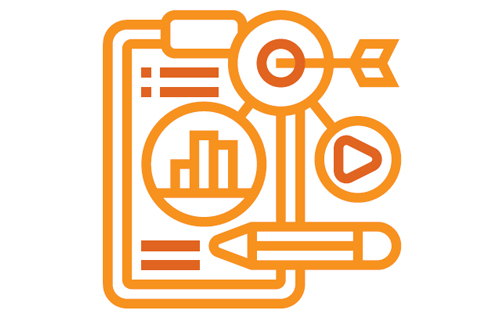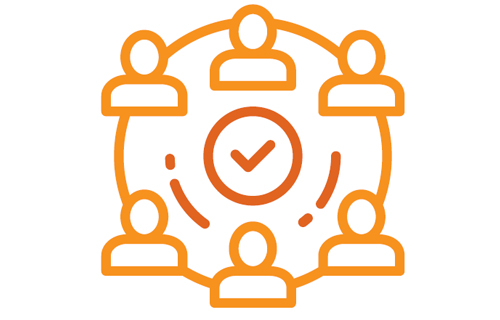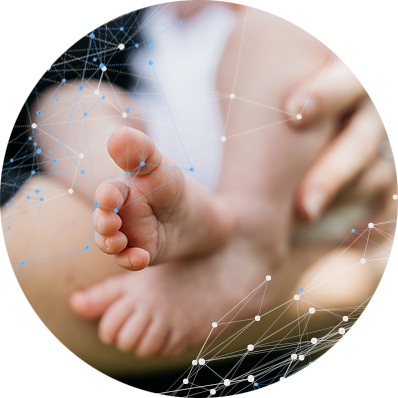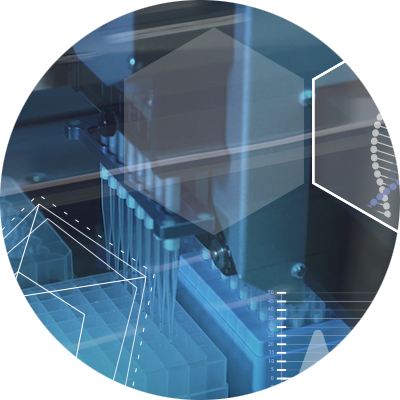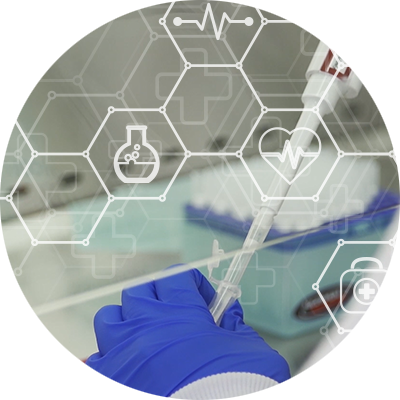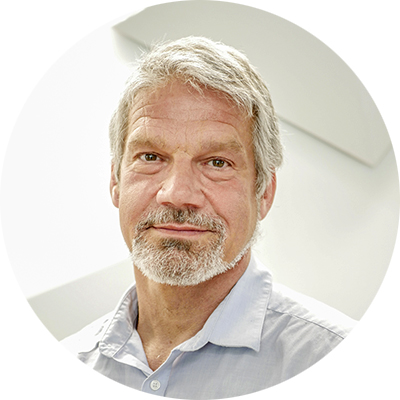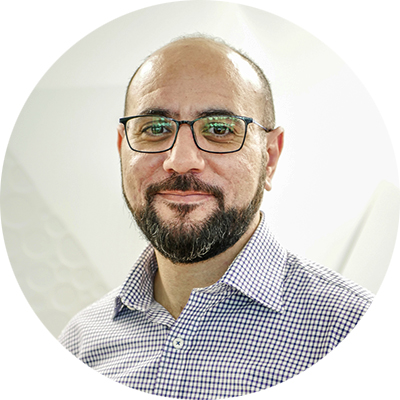
The Accelerator provides complete end-to-end solutions enabling parallel multi-omic analysis.
Our hybrid research/service platform provides comprehensive, tailored support spanning the entire nexus of multi-omics studies from experimental design, to sample collection and cutting-edge data analysis, coupled with full end-to-end logistics and administrative support tailored to each project. The Accelerator not only generates big data but transforms it to provide answers to your questions, accelerating progress, translation and impact of your research.
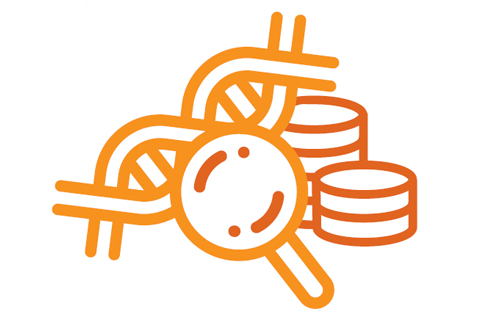
Access to cutting-edge technologies for all omics modalities and high end data analytics and bioinformatics at a competitive price
Premium level project management support tailored to your budget and level of expertise
Opportunities to connect and grow your collaborative networks by working with leaders in the field of systems biology and precision health
The Accelerator uses big data to address big questions and find precise, personalised solutions. We work with researchers around the globe to understand and identify your research challenge, and provide comprehensive, tailored support spanning the entire nexus of multi-omics studies from experimental design, to sample collection and data analysis, coupled with full end-to-end logistic and administrative support tailored to each project.
Lead CI: Professor Jonathan Carapetis
Collaborating Institutes: Cincinnati Children's Hospital Medical Center, Telethon Kids Institute Menzies School of Health Research, Edith Cowan University, University of Auckland
The RHD burden in Indigenous Australians is 6.6 times higher than in non-Indigenous Australians. Up to 50 percent of Indigenous patients already have established RHD at their first diagnosis, because preceding episodes of ARF were missed.
The Accelerator will apply comprehensive immune profiling to a discovery cohort in order to identify novel biomarkers for diagnosing ARF, which will be validated in a second cohort. Using transcriptomics, metabolomics and immune phenotyping, individual omic-profiles generated for ARF patients will be compared to healthy controls and across different population in Uganda and New Zealand, followed by an integrated analysis to identify the combination of biomarkers that provide the best predictive value for ARF.
Lead CI: Fiona Wood
Collaborating Institutes: Fiona Wood Foundation, PCH, UWA
Globally, 11 million people require medical attention for a burn injury each year. Australia alone records 200,000 new burn injuries every year, with paediatric cases accounting for 30% of this cohort. Beyond the pain and suffering of the acute injury, paediatric burn victims are at a massively increased risk for a wide range of diseases including cardiovascular, mental health conditions, cancer, diabetes mellitus, gastrointestinal and inflammatory diseases, for decades after the injury. In the general Australian population these same chronic medical conditions together constitute 65% of the entire disease burden. While these chronic diseases are presumed to have complex, multifactorial origins, the fact remains that a single minor burn trauma increases the risk of suffering from all these chronic ailments, suggests a common underlying cause.
The Accelerator will seek to identify the underlying cause through system biology approaches, offering the hope that targeted interventions could prevent onset of these chronic diseases. The ability to decipher the mechanisms linking pediatric acute burn trauma to an altered lifelong health trajectory has significant implications.
Not only can this be used to improve interventions for burn victims, but knowledge of the link between this acute trauma and long-term health should also reveal the mechanistic underpinnings for the most prevalent and complex chronic diseases afflicting society today. This in turn has the potential to identify effective interventions that will save millions of lives far beyond burn trauma.
Collaborators: Michael O’Sullivan, Perth Children's Hospital
The autoimmune lymphoproliferative syndrome (ALPS) is caused by an inheritable mutation of the FAS gene resulting in the abnormal survival of immune cells (lymphocytes). This tip in balance can potentially lead to a range of debilitating conditions including autoimmune disease and lymphoma. Intriguingly, the clinical manifestation resulting from the mutation are very broad, suggesting that there are other biological or environmental factors determining the severity of disease.
The Accelerator will aim to understand the basis for the poor genotype-phenotype correlation seem amongst ALPS patients using cutting edge genomic sequencing techniques from mutation positive and negative individuals and find the underlying explanation for why some individuals are mutation “healthy,” while others face severe health challenges.
Significantly, the approach taken in this study could potentially be replicated for other rare diseases caused by single-gene mutations in individuals who have to endure a long, painful and costly diagnostic odyssey in order to identify and understand the full impact of their condition.
Overall Lead CI: Nigel Curtis ; Melbourne Children’s Trials Centre (MCTC)
Perth Site Lead: Peter Richmond, Telethon Kids Institute (TKI)
The COVID-19 pandemic caused by severe acute respiratory syndrome coronavirus 2 (SARS-CoV-2) is causing havoc around the world. As of October 2020, 35.6 million cases had been confirmed worldwide. Healthcare workers are at the frontline of this pandemic and there is currently no vaccine for it. This randomized clinical trial enrolling more than 4000 healthcare workers across Australia and > 10,000 world-wide aims to find out whether the Bacillus Calmette-Guérin (BCG) vaccine, a vaccine known for its beneficial off target effects in reducing the viremia and the incidence of the acute upper tract respiratory infections might protect against COVID-19 by reducing the number of cases and /or the severity of the illness caused by the virus.
The Accelerator seeks to identify the underlying mechanisms of protection. Understanding this will offer the hope that in future disease outbreaks or in this current outbreak, BCG vaccination could be used as an early intervention to protect high-risk groups.
Lead CI: Stephen Stick, Tobias Kollmann
Collaborating Institute: Telethon Kids Institute (TKI), Pontificia Universidad Catolica de Chile
The spread of SARS-CoV-2 is continuing to devastate the health and economies of countries worldwide. Rapid introduction of public health measures had successfully contained the spread in some parts of the world but a ‘lockdown’ is not sustainable. Access to an efficient vaccine for everyone across the globe will take time. Meanwhile, interventions that can effectively reduce the spread of the virus are urgently needed. In this context, this randomized clinical trial includes 1240 subjects and aims to assess whether administration of Interferon (IFN) suppress contagiousness in infected participants as well as prevent infection of their close contacts.
The Accelerator will assess the host response to IFN intervention, SARS-CoV-2 infection and their interaction. Significantly, this approach could possibly entirely interrupt the spread of the virus, and with that, the pandemic.
Lead CI: Christopher Blyth
Collaborating Institute: Telethon Kids Institute (TKI)
Influenza is the most common vaccine-preventable disease and a major cause of hospitalisation, morbidity and mortality globally. Young children, particularly those younger than 6 months of age, are at heightened risk of severe influenza. Through this trial, The Accelerator will assess the immune response in infants less than 6 months of age who receive the current influenza vaccine. We expect that contrary to current dogma, immunization before 6 months will improve the immune response and with that protection. Importantly, early immunization will broaden the response, thus protecting better for years if not life.
This study will inform a larger clinical trial and help provide evidence for influenza vaccination policy in infants under 6 months of age.

